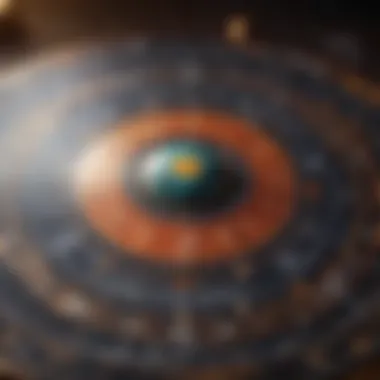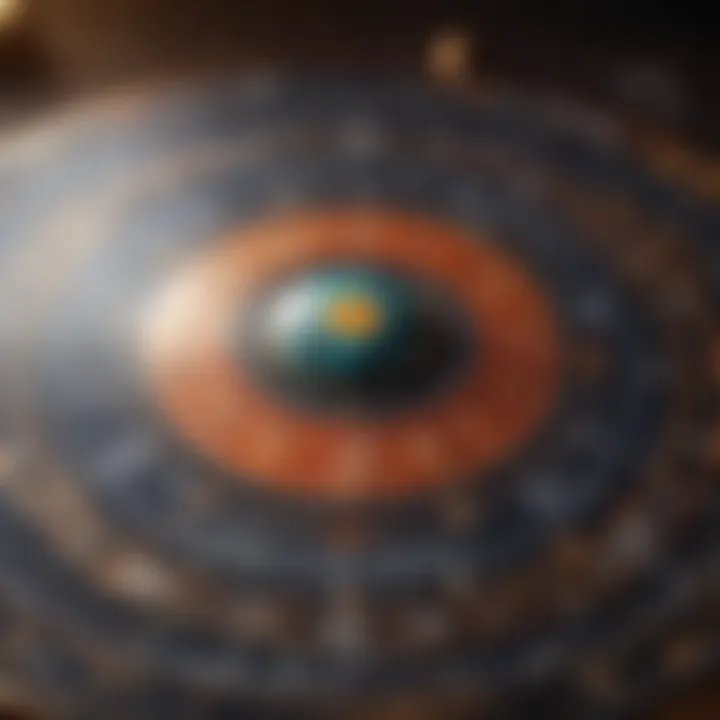Unlocking the Secrets of Your Personal Horoscope Birth Chart


Each celestial alignment offers a distinct opportunity for growth and can influence choices in significant ways.
Prelims to Horoscope Birth Charts
What is a Birth Chart?
A birth chart, also known as a natal chart, maps the positions of celestial bodies at the exact moment and location of a person's birth. It serves as a snapshot of the sky at that moment, detailing where the sun, moon, and planets were placed in the zodiac. Birth charts encompass twelve astrological houses, each representing different life areas, from relationships to career.
The construction of a birth chart relies on three key data points: the date, time, and geographic location of birth. With this information, astrologers can plot the celestial bodies' positions and start interpreting their meanings. Each sign and planet carries nuanced energy, affecting how they influence a person's life. The birth chart becomes a personalized map, unveiling potential strengths, weaknesses, and paths for growth.
The Importance of Personal Horoscopes
Personal horoscopes derived from birth charts are essential tools for self-discovery and awareness. They provide insights that help in personal development and decision-making. Understanding your astrological makeup can aid in recognizing patterns in behavior and emotional responses, leading to informed choices about relationships, career paths, and more.
Moreover, personal horoscopes enable individuals to navigate challenges by leveraging their inherent strengths. Astrological insights can help clarify motivations and desires, offering a clearer perspective on life's complexities. The significance of exploring these celestial influences cannot be overstated, as they connect deeply with one's identity and enabling self-acceptance through awareness of one's astrological factors.
"Understanding your birth chart is not just about knowing your sign, but exploring the intricate layers of your unique cosmic profile."
In summary, the introduction to horoscope birth charts sets the stage for further exploration of these astrological instruments. A personal birth chart opens up avenues for growth and understanding that many find transformative. Recognizing the depth of insights these charts hold can lead to a more fulfilling and self-aware existence.
Fundamental Components of Birth Charts
Understanding the fundamental components of birth charts is crucial for anyone seeking insights through astrology. These components serve as the building blocks of a personal horoscope. Each aspect, from zodiac signs to planets, houses, and aspects, plays a distinct role in defining personality and life events.
The Role of Zodiac Signs
Zodiac signs are the most recognizable element of astrology. They represent different personalities and traits shaped by the sun's position at the time of birth. Each of the twelve zodiac signs has its own qualities, strengths, and weaknesses.
Every zodiac sign has an associated symbol, element, and ruling planet which enrich its interpretation. For instance, the fiery Aries is known for its energetic and assertive nature, while the grounded Taurus tends to be more practical and patient. Understanding your zodiac sign offers a window into your inherent characteristics. However, ones birth chart does not solely rely on the sun sign; the positions of the moon and rising sign also significantly influence a person's nature and behavior.
Planets and Their Influence
In astrology, planets are viewed as key players that drive personal dynamics. Each planet corresponds with various aspects of life. For example, Mercury is known for communication and intellect, while Venus governs love and aesthetics. The placement of these planets in the zodiac can affect personal development, relationships, and even career paths.
In one's birth chart, the interaction between personal planets (like the Moon and Mercury) and outer planets (such as Uranus and Neptune) creates a rich tapestry of influence. Each planet’s position offers insights into specific areas of life, contributing to a comprehensive understanding of an individual’s potential challenges and strengths.
Astrological Houses Explained
Astrological houses divide the birth chart into twelve sections, each representing different realms of life. These houses detail how various influences manifest in different areas—relationships, career, health, and more.
The first house is associated with self-image and appearance, while the seventh house pertains to partnerships and marriage. Knowing which planets reside in which houses can illuminate areas of focus in a person's life and show where attention is needed. It is essential to explore the meaning of each house comprehensively, as they dictate how astrological influences play out in real experiences.
Understanding Aspects
Aspects in astrology refer to the angles formed between planets. These angles affect how planets interact with one another, creating either harmony or tension in the chart. Major aspects, like conjunctions, trines, and squares, indicate powerful influences on an individual’s life. Each aspect holds specific significance; for example, a conjunction can signify merging energies, whereas a square may indicate a challenge that requires resolution.
Minor aspects, while subtle, can also impact a chart. They contribute to the nuanced dynamics in one's personality. Understanding these subtle influences provides a deeper insight into the complexity of individual experiences.
Each component of a birth chart contributes to a unique narrative that aids in personal understanding and growth.
Recognizing the interplay between these various elements deepens one's insights into the self. With a more holistic grasp of zodiac signs, planetary influences, houses, and aspects, one can effectively use astrology as a tool for personal growth and self-discovery.
Creating Your Birth Chart
Creating a birth chart is essential in astrology as it serves as a foundational tool for personal insight. This process allows individuals to map out the positions of celestial bodies at the moment of their birth. Understanding your birth chart can help unveil a variety of personal traits, potential challenges, and opportunities in your life. The nuances of a birth chart offer a lens through which to understand one's personality and circumstances.
When you generate a birth chart, it is imperative to gather precise information. This chart becomes a roadmap of your astrological influences. Therefore, being accurate in the data you provide can enhance the chart's effectiveness in interpretation and analysis.


Necessary Information to Generate a Chart
To create a comprehensive birth chart, three crucial elements must be collected: your exact date of birth, precise time of birth, and location of birth. Each of these factors plays a significant role in determining the positions of planets and their respective houses within your chart.
- Date of Birth: This marks the day and is pivotal for identifying the zodiac sign the sun was transiting during your birth.
- Time of Birth: The exact time is often critical due to the moon’s swift movement and the ascendant sign, which changes approximately every two hours.
- Location of Birth: This defines the geographical coordinates, impacting the astrological houses in your chart.
Gathering this information ensures a more accurate chart that reflects true astrological influences.
Utilizing Online Tools for Chart Creation
Today, many online tools can help create your birth chart using the information you've gathered. These platforms typically provide user-friendly interfaces. Here are some recommended resources:
- Astro.com: This site offers in-depth birth chart calculations and additional astrological insights.
- Cafe Astrology: Known for its comprehensive chart analysis, it also provides reports describing various chart components.
- Astrolabe: Offers detailed birth chart generation along with various custom reports.
Using these online tools simplifies the process. Input your precise information, and they generate the chart with relevant aspects and positions displayed.
Interpreting Chart Data
After generating a birth chart, the next phase involves interpreting the data. Understanding the components of your chart is paramount to unlocking personal insights. Begin by exploring the sun sign, moon sign, and rising sign, as these fundamentally shape personality.
- Zodiac Signs: Each zodiac sign encompasses unique traits and characteristics. Identifying your sun, moon, and rising signs can lay the groundwork for understanding core aspects of your personality.
- Planets: Assess the role of each planet in different signs and houses to comprehend influences on emotions, intellect, and life events.
- Houses: Recognize which areas of life the houses cover, as this reveals where these influences may manifest in daily experiences.
- Aspects: Analyze the angles between planets to understand the dynamics of relationships between various energies in your chart.
Understanding your birth chart is not just an ancient practice; it is a key to unlocking insights that can guide personal growth and decision-making.
By combining these interpretations, one can develop a holistic view of how astrological factors intertwine to shape individual experiences. Identifying themes or challenges enriched by planetary movements leads to deeper self-awareness, which often can inform future actions and choices.
Detailed Analysis of Zodiac Signs
Understanding the characteristics of zodiac signs plays a pivotal role in personal horoscope birth chart interpretation. Each sign embodies unique traits that influence personality, behavior, and life choices. By analyzing these signs, one gains valuable insights into themselves and their interactions with others. This analysis is essential for self-growth and establishing meaningful connections.
Fire Signs and Their Characteristics
Fire signs consist of Aries, Leo, and Sagittarius. They are known for their energetic and passionate nature. Individuals with these signs often exhibit a sense of adventure and enthusiasm. Their confidence can draw others to them, making them natural leaders. However, they may also face challenges such as impulsiveness and a tendency toward arrogance. Understanding these traits can help individuals harness their strengths and mitigate their weaknesses.
Earth Signs and Practicality
Earth signs include Taurus, Virgo, and Capricorn. These signs are grounded and practical by nature. They often value stability and material security, which influences their approach to life. Earth signs are methodical, reliable, and tend to be detail-oriented. They may resist change, which can sometimes limit their growth. Recognizing these characteristics allows individuals to appreciate their practicality while remaining open to new experiences.
Air Signs and Communication
Air signs encompass Gemini, Libra, and Aquarius. Communication is their forte, and they are often intellectual and social creatures. These signs thrive on ideas and connections with others. While they are great at expressing themselves, they might struggle with emotional depth. Understanding their strengths in communication can help them develop better interpersonal relationships and avoid superficial engagements.
Water Signs and Emotion
Water signs consist of Cancer, Scorpio, and Pisces. These signs are deeply intuitive and emotional. They possess a capacity for empathy and understanding, drawing them to artistic and creative pursuits. However, they might experience overwhelming feelings, which can complicate their interactions with others. Recognizing these emotional depths allows individuals to channel their feelings constructively and connect with others on a profound level.
Each zodiac sign presents distinct qualities that shape individual experiences significantly. Understanding these can lead to profound insights into one's personality and help with navigation in relationships and personal growth.
Significance of Planets in Your Chart
The planets play a crucial role in understanding your horoscope birth chart. Each planet carries its own energies and characteristics, influencing various aspects of life. This section will help clarify how planets affect your personal astrology.
Understanding the significance of planets in your chart is essential. Each planet represents different facets of life, from communication to emotions. When we analyze their positions in the chart, we gain insights about our strengths, weaknesses, and overall tendencies. Moreover, this understanding can illuminate how we interact with the world and the nature of our relationships.
Personal Planets and Their Impacts
Personal planets include the Sun, Moon, Mercury, Venus, and Mars. These planets reflect your personality and immediate experience. For instance:


- Sun: Represents your core self and vital essence. It indicates your identity and purpose.
- Moon: Governs your emotions and instincts. It reveals how you handle feelings and your subconscious needs.
- Mercury: Signifies communication style and thinking processes. It influences how you express thoughts.
- Venus: Represents love, beauty, and attachment. It guides how you relate to others.
- Mars: Represents energy, action, and desire. It shows your drive and assertiveness.
The interaction of these personal planets will define your unique personality traits. For example, a harmonious aspect between Venus and Mars may suggest smooth relationships, while challenging ones may indicate conflicts in desires.
Outer Planets and Generational Influence
Outer planets include Jupiter, Saturn, Uranus, Neptune, and Pluto. These planets exert their influence over broader societal trends and generational characteristics. They affect less thn just the individual; their impacts are felt across generations.
- Jupiter: Associated with growth, expansion, and prosperity. It reflects your ideals and philosophical beliefs.
- Saturn: Represents responsibility, discipline, and structure. It indicates life lessons and challenges.
- Uranus: Symbolizes innovation, disruption, and reform. It guides changes and your approach to freedom.
- Neptune: Associated with dreams, spirituality, and illusions. It governs your intuition and creativity.
- Pluto: Represents transformation, power, and renewal. It indicates profound changes and personal evolution.
Outer planets reflect generational themes more than immediate personal experiences. Their positions can show how larger societal changes shape a person’s life over time.
Analyzing these outer planets alongside personal planets creates a more complete understanding. You can see how individual motivations interact with greater societal forces. This layered analysis enriches the interpretation of your birth chart and its significance in your life.
Astrological Houses and Their Meanings
Understanding astrological houses is vital in interpreting your personal horoscope birth chart. Houses reflect various aspects of your life and signify where different energies manifest. Each of the twelve houses relates to a distinct area, such as relationships, career, and personal identity. Recognizing these houses aids in extracting meaningful insights from your birth chart. It helps you understand how planetary positions operate and influence different life events.
Understanding Each House
Each astrological house serves as a focal point in your chart, representing specific topics and influences. The first house, known as the Ascendant, symbolizes self-image and personal identity. The second house relates to personal finances and material possessions. As you continue through the twelve houses, you will find them covering various themes:
- Third House: Communication and thought processes.
- Fourth House: Home and family.
- Fifth House: Romance and creativity.
- Sixth House: Work, health, and daily routines.
- Seventh House: Partnerships and marriage.
- Eighth House: Transformation, death, and shared resources.
- Ninth House: Philosophy, travel, and higher education.
- Tenth House: Career and public image.
- Eleventh House: Friendships and aspirations.
- Twelfth House: Subconscious and hidden matters.
Each house's influence varies based on the signs and planets present at the time of your birth. The unique combinations of these elements shape your experiences.
The Significance of House Rulership
House rulership adds another layer of depth to your chart interpretation. Each house has a ruling planet associated with it. This planet provides additional insight into that house's energy and significance. For instance, if your second house is ruled by Venus, your financial matters may be connected to beauty, luxury, and partnerships.
Knowing house rulership can help you understand how the ruling planet's characteristics impact the house's themes in your life.
In addition to the ruler of each house, the placement of the ruling planet in your chart further enhances your insights. This synergy between houses and their rulers enriches the interpretation, allowing you to harness astrological knowledge for personal growth and understanding. By studying the context of house rulership, you gain tools for navigating life's challenges and opportunities effectively.
Aspects and Their Interpretations
Aspects in astrology refer to the angles formed between planets in a birth chart. These angles are crucial in shaping how the planetary energies interact and manifest in a person's life. Understanding aspects is important as they can provide deeper insights into behaviors, motivations, and challenges an individual may face. The nature of the aspect influences whether the energies are harmonious or challenging, impacting personal growth and relationships.
Astrological aspects highlight the dynamic interactions between different elements of your chart. Here, we delve into the main types of aspects, focusing on their meanings and effects.
Major Aspects and Their Effects
Major aspects are primary angles formed between planets, such as conjunctions, squares, and trines. These aspects significantly influence the energies at play in a person's life.
- Conjunction occurs when two planets are very close together, amplifying their energies. For example, a conjunction between the Sun and Mars can bring forth strong drive and determination.
- Square denotes a 90-degree angle, often associated with tension or conflict. A square between Mercury and Uranus may indicate challenges in communication or unexpected ideas.
- Trine represents a 120-degree angle that signifies harmony and ease. When Venus is trine to Jupiter, one may experience joy in relationships and abundance.
- Opposition is a 180-degree angle signifying balance and polarity. This aspect can highlight areas of conflict or duality in one’s life, requiring awareness and compromise.
These major aspects shape the core themes of one’s personality and life journey. They serve as indicators of natural talents, conflicts, and the areas where one may grow or face obstacles.
Minor Aspects and Subtle Influences
Minor aspects, while less emphasized than major ones, can provide nuanced insights into a person's chart. They often illustrate subtler influences that affect daily life and relationships.
- Semi-square (45 degrees) creates a sense of irritation that can push for change, often manifesting as small frustrations.
- Quincunx (150 degrees) suggests a need for adjustment between two conflicting energies. This can lead to feelings of unease until the energies are integrated or balanced.
- Inconjunct (also 150 degrees) can signify misalignment or confusion in personal or relationship matters.
Understanding these minor aspects can enhance the overall interpretation of a birth chart. They may illuminate angles of life that are not immediately obvious but nonetheless significant.
Overall, aspects play a crucial role in interpreting birth charts, blending the forces of personality and experience into a coherent narrative that explains individual paths through life.


Practical Applications of Your Birth Chart
Understanding the practical applications of your birth chart is essential for harnessing the insights it offers. A birth chart is not just a collection of symbols and positions; it serves as a map for personal development, decision-making, and understanding relationships. This section will explore how to utilize astrological insights effectively.
Using Astrology for Personal Growth
Astrology can play a significant role in personal growth. By studying your birth chart, you can identify your strengths and weaknesses. For example, knowing your Sun sign can help you understand your core identity, while your Moon sign can give insight into your emotional needs. This awareness allows you to focus on areas that may require improvement.
- Identify Strengths: Acknowledging positive traits can build confidence.
- Recognize Weaknesses: Understanding challenges enables proactive change.
- Personal Goals: Aligning personal goals with astrological insights may lead to more success.
Utilizing this information encourages self-reflection and gradual improvement.
Astrological Insights for Decision-Making
Astrology can enhance decision-making in various areas of life. By consulting your birth chart, you can access insights into timing and suitable choices. For instance, knowing the transits affecting your chart can aid in identifying optimal moments for career changes or personal projects.
- Timing: Certain planetary alignments may favor specific actions.
- Clarity: Insights can provide clarity in complex situations.
- Informed Choices: Knowledge of astrological influences assists in making informed decisions.
These benefits are particularly relevant for determining the right path in career and personal life.
Relationship Dynamics Explained
Understanding relationship dynamics through astrology is valuable. Each person's birth chart interacts with others, forming a connection that transcends surface-level traits. Compatibility can be assessed by exploring Venus and Mars placements, which relate to love and attraction.
- Analyze Compatibility: Understanding synastry can reveal relationship strengths and challenges.
- Conflict Resolution: Insights into differing needs can ease misunderstandings.
- Emotional Needs: Recognizing each partner's emotional makeup fosters deeper connections.
Astrology enriches relationships by providing a framework for communication and understanding, allowing for more profound connections.
Incorporating astrological perspectives into your life can lead to enhanced self-awareness and stronger relationships.
Exploring Astrology in Modern Context
Astrology is not merely an esoteric art, it has become increasingly significant in contemporary society. In today’s rapidly shifting world, many individuals seek stability and guidance. Astraogical practices, particularly personal horoscope birth charts, offer insights into one’s identity and life path. An informed understanding of astrology can enhance self-awareness and provide clarity as individuals navigate their lives, making it an essential component of modern self-exploration.
The Rise of Astrology Among Millennials and Gen Z
The interest in astrology has surged among Millennials and Gen Z. These generations often face unprecedented challenges, including the pressures of digital communication and economic instability. As a result, many turn to astrology as a source of comfort. Birth charts serve as a roadmap, helping to decode personal struggles and challenges. Astrology provides a language for understanding complex emotions and relationships. Social media platforms amplify this trend; astrology, memes, and horoscopes circulate rapidly, creating a community of enthusiasts who share knowledge and experiences. Many find the insights from their birth charts help facilitate conversations about their lives and desires.
Astrology and Mental Health
Astrology's relevance extends into the realm of mental health. Engaging with one’s birth chart may foster introspection. Individuals often report feeling more empowered as they better understand their traits, strengths, and weaknesses through astrological lenses. Each position in a birth chart can signify various emotional predispositions, guiding individuals towards self-care practices that resonate with their nature.
"Astrology can be a valuable tool for reflection, offering potential pathways for personal healing and growth."
Research indicates that considering astrological insights can enhance coping strategies, allowing a deeper appreciation of personal challenges. As discussions around mental health evolve, astrology can serve as an accessible means of addressing these significant topics, offering individuals a framework for personal understanding without judgment. The continued integration of astrology into wellness practices makes it a pivotal aspect of modern life.
With this understanding, astrology emerges not just as a mystical science, but as a valuable method of exploring inner landscapes and facilitating personal growth.
Finale
Reflecting on Personal Insights
Reflecting on personal insights derived from your birth chart fosters self-awareness. Each planet, sign, and house within the chart reveals intricate details about strengths and challenges. By interpreting these components, individuals can gain clarity about their behavioral patterns and emotional responses. For instance, a strong Mars placement might indicate assertiveness, while a prominent Moon could highlight emotional depth.
This deeper understanding allows one to make informed choices. It can illuminate areas in life that require attention or nurture. Similarly, recognizing the interplay between the different astrological elements lets individuals embrace their unique qualities, helping them navigate personal growth. Ultimately, such reflections lead to a more authentic, tailored approach to life.
Future Trends in Astrology
Looking ahead, astrology is evolving alongside modern society. Younger generations are increasingly appreciating its relevance. Millenials and Gen Z are not just passive consumers but are actively engaging with astrological content online. Platforms like Reddit and Facebook foster communities that discuss astrological insights extensively.
The future trend also hints at enhanced integration with mental health practices. More individuals are acknowledging astrology's potential role in understanding psychological patterns and emotional health. As we navigate our complex world, astrology may serve as a complementary tool for self-reflection and personal development. Exploring this intersection could redefine how we utilize astrological insights, moving from mere curiosity to practical application in daily life.
Astrology is not just about fortune-telling but rather a framework for understanding one's self and improving life choices.







